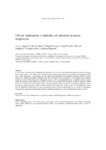Clinical implications of epithelial cell plasticity in cancer progression

View/
Use this link to cite
http://hdl.handle.net/2183/21580
Except where otherwise noted, this item's license is described as Atribución-NoComercial-SinDerivadas 3.0 España
Collections
- Investigación (FCS) [1293]
Metadata
Show full item recordTitle
Clinical implications of epithelial cell plasticity in cancer progressionAuthor(s)
Date
2015Citation
A. Aparicio L, Blanco M, Castosa R, et al. Clinical implications of epithelial cell plasticity in cancer progression. Cancer Lett. 2015; 366(1): 1-10
Abstract
[Abstract] In the last few years, the role of epithelial cell plasticity in cancer biology research has gained increasing attention. This concept refers to the ability of the epithelial cells to dynamically switch between different phenotypic cellular states. This programme is particularly relevant during the epithelial-to-mesenchymal transition (EMT) in cancer progression. During colonization, epithelial cells first activate the EMT programme to disseminate from a primary tumour to reach a distant tissue site. During this process, cells are transported into the circulation and are able to escape the immune system of the host. Then, a reverse process called mesenchymal-to-epithelial transition (MET) occurs on cells that settle in the distant organs. Although epithelial cell plasticity has an important impact on tumour biology, the clinical relevance of this concept remains to be recapitulated. In this review, we will update the current state of epithelial cell plasticity in cancer progression and its clinical implications for the design of therapeutic strategies, the acquisition of multidrug resistance, and future perspectives for the management of cancer patients.
Keywords
Cancer stem cells
Circulating tumor cells
Drug resistance
Epithelial plasticity
Medical perspective
Circulating tumor cells
Drug resistance
Epithelial plasticity
Medical perspective
Description
Mini-review
Editor version
Rights
Atribución-NoComercial-SinDerivadas 3.0 España
ISSN
0304-3835






